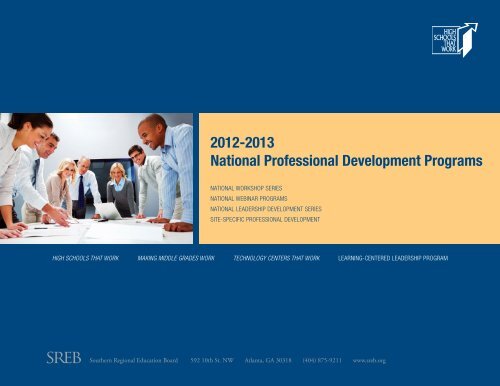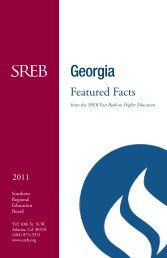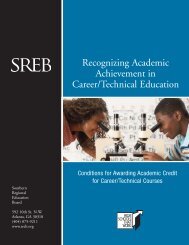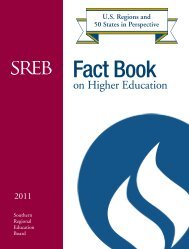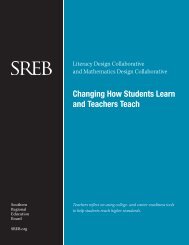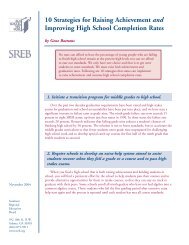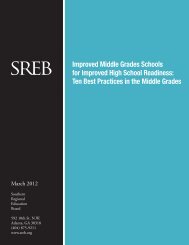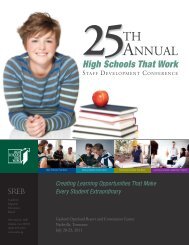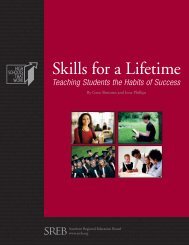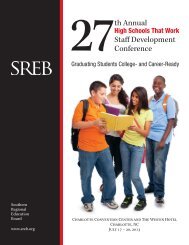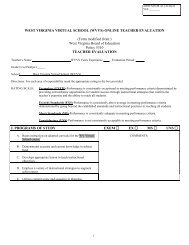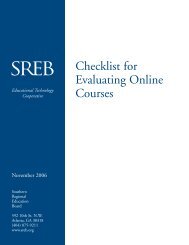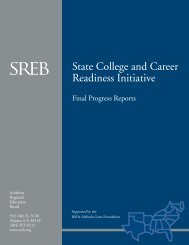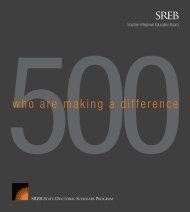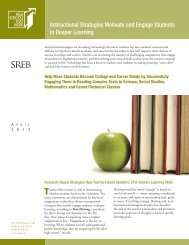2012-2013 National Professional Development Programs
2012-2013 National Professional Development Programs
2012-2013 National Professional Development Programs
You also want an ePaper? Increase the reach of your titles
YUMPU automatically turns print PDFs into web optimized ePapers that Google loves.
<strong>2012</strong>-<strong>2013</strong><strong>National</strong> <strong>Professional</strong> <strong>Development</strong> <strong>Programs</strong>NATIONAL WORKSHOP SERIESNATIONAL WEBINAR PROGRAMSNATIONAL LEADERSHIP DEVELOPMENT SERIESSITE-SPECIFIC PROFESSIONAL DEVELOPMENTHIGH SCHOOLS THAT WORK MAKING MIDDLE GRADES WORK TECHNOLOGY CENTERS THAT WORK LEARNING-CENTERED LEADERSHIP PROGRAMSouthern Regional Education Board 592 10th St. NW Atlanta, GA 30318 (404) 875-9211 www.sreb.org
<strong>2012</strong>-<strong>2013</strong> <strong>National</strong> <strong>Professional</strong> <strong>Development</strong> HighlightsNATIONAL WORKSHOP SERIESFour face-to-face opportunities for high schools,middle grades schools and technology centers.1. Advancing Achievement Through Quality Teaching:Developing Instructional Strategies to Embed theCommon Core State or Other Rigorous Standards2. Pathways for Success: Preparing College- and Career-Ready Graduates for Postsecondary Achievement3. High-Quality Career/Technical Instruction for the21st-Century4. <strong>National</strong> Technology Centers That Work Leaders’Forum: Technology Centers of the FutureNATIONAL WEBINAR PROGRAMSix customizable Webinar series for high school,middle grades and technology center professionallearning communities and leadership teams.Mathematics Series1. Embedding Mathematics into Career/TechnicalStudies2. Improving Mathematics Instruction Using theCommon Core State or Other Rigorous Standardsfor Middle Grades3. Improving Mathematics Instruction Using theCommon Core State or Other Rigorous Standardsfor High SchoolLiteracy Series4. Embedding Literacy into Career/Technical Studies5. Improving Literacy Instruction Using theCommon Core State or Other Rigorous Standardsfor Middle Grades6. Improving Literacy Instruction Using theCommon Core State or Other Rigorous Standardsfor High SchoolNATIONAL LEADERSHIP DEVELOPMENT SERIESSeven Web-based courses for veteran and aspiring leaders,district and school leadership teams, regional consortia,and state education agencies.1. Using Root Cause Analysis to Create a High-Performance Learning Culture2. Assessing Academic Rigor in School and ClassroomPractices3. Leading Schoolwide Literacy Initiatives4. Building Instructional Leadership Teams to LeadChange for Student Success5. Organizing Resources for a Personalized LearningEnvironment6. Mapping the Curriculum to Grade-Level andCollege-Readiness Standards7. Designing Assessment to Improve Student LearningSITE-SPECIFIC PROFESSIONAL DEVELOPMENTHigh Schools That Work can help you maximize resources by providing on-site support and customized professional development services on a variety of topics and strategiesthrough various delivery methods. A skilled school improvement facilitator will help your team revise or re-energize your professional development plan to achieve desiredoutcomes and objectives. For more information about these services, please contact profdevprograms@sreb.org3
Advancing Achievement Through Quality Teaching: Developing Instructional Strategies to Embedthe Common Core State or Other Rigorous StandardsOCTOBER 30 – NOVEMBER 1, <strong>2012</strong>, ATLANTA, GAREGISTRATION FEE: $300 PER PERSONWHO SHOULD ATTENDThis workshop is designed for teams of middle grades and high school academic and career/technical (CT) teachers, school leadership teams, and district leaders representing schoolsystems and schools participating in any SREB school improvement initiative (HSTW,MMGW or TCTW ). Participants are encouraged to bring a laptop computer or portableelectronic device.WHY YOU SHOULD PARTICIPATEThis workshop will address the Common Core State Standards (CCSS) or other rigorousstandards for mathematics and literacy in history/social studies, science and technicalsubjects; and demonstrate engaging strategies that will escalate student achievementthrough challenging and motivating assignments. Participants will learn about the LiteracyDesign Collaborative (LDC) and the Mathematics Design Collaborative (MDC)* and willunderstand how these frameworks offer a flexible guide for participants to meet the rigorouscore state standards while adapting assignments and assessments to their instructional plan.Our lead-specialists will guide participants through the LDC and MDC frameworks that willnot only improve awareness and implementation of the CCSS, but will also give participantsa systematic plan that will engage students in intellectually demanding assignments.Through a follow-up Webinar, attendees can extend the face-to-face workshop bybecoming part of a professional learning community (PLC) in order to share examplesof standards-based assignments and assessments, and to share successes and challenges ofimplementing the LDC and MDC framework.WORKSHOP OBJECTIVES• Review the new rigorous core state standards and how these impact current practices.• Gain specific strategies to embed the CCSS into classroom instruction in academic andCT courses.• Use standards-based planning processes to collaboratively develop high-quality,intellectually demanding assignments and classroom assessments.• Ensure that the habits of independent learners are intentionally taught so that studentscan adopt them and increase their chances to successfully transition to further study orcareers.• Develop a preliminary action plan to share workshop information with colleaguesnot in attendance, and determine “big ideas” for designing other professional learningopportunities based on workshop content.WORKSHOP STRANDSSTRAND 1: Implementing the CCSS Through the LDC for Middle GradesSTRAND 2: Implementing the CCSS Through the LDC for High SchoolSTRAND 3: Implementing the CCSS Through the LDC for CT StudiesOBJECTIVES FOR STRANDS 1 THROUGH 3:• Understand how the CCSS are organized by core content areas, including technicalsubjects, and how the responsibility for teaching these standards is distributedthroughout a school.• Work collaboratively to connect the experiences of reading, writing and thinking usingprototypes of robust literacy assignments that help teachers work more efficiently acrosscontent areas.• Learn how to embed CCSS for literacy into assignments and specially designed tasksto advance students’ readiness for challenging high school studies and postsecondarystudies and careers.• Learn the elements and tools of a literacy framework that is aligned to the CCSS andprovides a more systematic approach to planning and implementing literacy instructionso more students’ graduate college- and career-ready and proficient in needed reading,writing and thinking skills.• See how to quickly adjust literacy instruction at the right time for the right studentsbased on classroom assessment information.• Develop an action plan for building a repository of rigorous standards-based literacyinstructional materials to be used for sustaining schoolwide literacy initiatives.STRAND 4: Designing Instruction to Meet the CCSS Through the MDC for Middle GradesSTRAND 5: Designing Instruction to Meet the CCSS Through the MDC for High SchoolSTRAND 6: Implementing the CCSS Through the MDC for CT StudiesOBJECTIVES FOR STRANDS 4 THROUGH 6:• Understand how the CCSS are organized and how proficient student performanceis described.• See how to embed CCSS mathematics standards through assignments and a seriesof formative assessment lessons (FALs) into mathematics-based and elective coursesto advance students’ readiness for challenging high school mathematics courses andpostsecondary studies and careers.• Learn new tools designed to help teachers quickly uncover student misconceptionsand adjust instruction to meet their needs as they master standards.4
Pathways for Success: Developing 21st-Century Graduates for Postsecondary Achievement (Continued)NOVEMBER 12 – 14, <strong>2012</strong>, ATLANTA, GAREGISTRATION FEE: $300 PER PERSON• Develop a deeper awareness of the CCSS for literacy and mathematics and anunderstanding of how to embed these into classroom assignments in both academicand CT classrooms.• Create a support system for students that connect them to an adult who will mentorand support them throughout high school.STRAND 3: Reconstructing Guidance and Advisement Services for Career Pathway <strong>Programs</strong>STRAND OBJECTIVES:• Examine the CCSS and how the guidance program can provide supportive services.• Identify aspects of guidance and advisement programs that may need to be restructuredto support career pathways/programs of study that join a college-ready academic corewith intellectually demanding CT courses.• Gain strategies to involve postsecondary education partners in aligning curriculato postsecondary standards, establishing possibilities for dual credit and formingpartnerships designed to prepare more students for further study.• Learn how to include industry representatives in the establishment and continuousimprovement of programs of study focused on preparing students for careers.STRAND 4: Designing and Delivering Quality Pathway <strong>Programs</strong> of Study Using Standards-Based Collaborative PlanningSTRAND OBJECTIVES:• Learn how the CCSS can be incorporated into current classroom practices and howmore students can be engaged in assignments.• Examine key conditions for successful programs of study and how to align theseprograms and curricula with state, national and industry standards.• Identify ways to permit more collaborative planning time for academic and CTfaculty to develop project- and problem-based assignments that strengthen students’knowledge and skills using real-world and workplace scenarios.• Identify end-of-pathway assessment protocols and plan end-of-course assessments thatmeasure technical and academic skill attainment.WORKSHOP SCHEDULENOVEMBER 12, <strong>2012</strong>11 a.m. – 1 p.m. Registration1 – 2 p.m. General Session2:15 – 4:30 p.m. Workshop Strands4:30 p.m. Adjourn4:30 – 5 p.m. Webinar Program Planning for Team LeadersNOVEMBER 13, <strong>2012</strong>7 – 8 a.m. Continental Breakfast8 a.m. – Noon Workshop StrandsNoon – 1 p.m. Lunch1 – 4 p.m. Workshop Strands4 p.m. AdjournNOVEMBER 14, <strong>2012</strong>7 – 8 a.m. Continental Breakfast8 – 11 a.m. Workshop StrandsNoonAdjournHOTEL INFORMATIONGeorgia Tech Hotel and Conference Center800 Spring Street, N.W.Atlanta, GA 30308www.gatechhotel.comRESERVATIONS(800) 706-2899 or (404) 838-2100ROOM RATEReserve by October 14, <strong>2012</strong> to receive the SREB rate of $149.00 per night withcomplimentary wireless internet.FEE$300 per person — includes two continental breakfasts, three refreshment breaks, onelunch, participant materials and access to the follow-up Webinar program(s).PROFESSIONAL DEVELOPMENT CREDITAfter the face-to-face workshop, each participant will receive a certificate of participationwhich can be submitted to the district or state for professional development credit. Thosethat complete the follow-up Webinar(s) and submit a completed action plan will receiveanother certificate for completing those professional learning activities.7
High-Quality Career/Technical Instruction for the 21st CenturyJANUARY 28 – 29, <strong>2013</strong>, GREENVILLE, SCREGISTRATION FEE: $300 PER PERSONThis workshop is cosponsored by the <strong>National</strong> Research Centerfor Career and Technical Education (NRCCTE) and SREB/HSTW.WHO SHOULD ATTENDState and district professional development directors, district and school leadershipteams, instructional leaders, teacher-leaders, and CT department heads. Participants areencouraged to bring a laptop computer or portable electronic device.WHY YOU SHOULD PARTICIPATELearn how to increase the quality of instruction in your CT programs through professionaldevelopment in classroom planning, assessment, and integration of literacy and numeracyinto instruction in ways that will boost student achievement. CT teachers will receive moreideas on how to actively engage students, manage the classroom and motivate students towork hard.This workshop will target the unique challenge facing CT teachers in the 21st-century— to engage increasingly diverse student populations in learning the technical, academic,and 21st-century knowledge and skills necessary for success in further learning and theworkplace.The workshop is designed around a research-based professional development model forCT teachers sponsored by the NRCCTE (funded through the Office of Vocational andAdult Education and U.S. Department of Education*) and developed in collaborationwith SREB. The strands of the workshop focus on essential instructional skills for CTteachers: standards-based instructional planning, the use of research-based instructionalstrategies, a comprehensive approach to assessment, and a classroom managementapproach that creates a climate of personalization and support. Participants will examinethe significance of each of these instructional skills, distinguish them from the skills oftraditional CT classrooms and develop a plan to increase teachers’ capacity in these areas.A follow-up Webinar series will be provided to support school teams as they undertakeimprovements to their current program offerings.WORKSHOP OBJECTIVES• Create short- and long-term instructional plans based on the varying learning needsof students.• Actively engage students through instructional strategies that encourage thedevelopment of problem-solving, critical-thinking and teamwork skills.• Design formal and informal assessment strategies to evaluate student progress towardlearning goals, provide feedback to improve student leaning, and inform changes toimprove instruction.• Create a classroom and lab environment that encourages motivation, positive behaviorand collaboration among learners.• Reflect, individually and collaboratively, on the effects of instruction and use thereflective process to continually improve instructional practice.WORKSHOP STRANDSSTRAND 1: Instructional PlanningThis strand will provide a strong rationale for instructional planning and introduceparticipants to four essential planning tools — curriculum maps, course syllabi, unit plansand lessons plans — specifically designed for CT courses. To design instructional plansthat result in students being well prepared for further learning and the workplace, theworkshop will explain how to consider both CT subject matter and the needs and concernsof students.STRAND 2: Research-Based Instructional StrategiesThis strand will help participants develop a clear understanding of what it means to activelyengage students in instruction that is intellectually challenging. The focus will be on avariety of instructional strategies to encourage students’ development of critical-thinking,problem-solving, academic and technical skills. Project-based learning, cooperative learning,and the integration of academic and technical content are the three strategies emphasized inthe workshop.STRAND 3: Classroom AssessmentThis strand is designed to help participants develop a clear understanding of the definitionof assessment and how teachers use assessment to improve student motivation, studentlearning and the quality of instruction. Participants will discuss the difference betweenformative and summative assessment, types of assessment tools, and characteristics ofhigh-quality assessment. Teachers will learn how to develop assessment tools and analyzeways to record assessment data and determine a course grade.8
JANUARY 28 – 29, <strong>2013</strong>, GREENVILLE, SCHigh-Quality Career/Technical Instruction for the 21st Century (Continued)REGISTRATION FEE: $300 PER PERSONSTRAND 4: Classroom ManagementThis strand will help participants develop a classroom environment that encouragesstudent motivation, positive behavior and collaboration. After establishing the overallgoals of classroom management, we will focus on creating a classroom environment thatis personalized, motivated and well-organized for learning, with a particular emphasison the first weeks of school. Finally, the workshop will provide strategies for respondingto students’ unwanted behavior through the use of appropriate consequences andinterventions that foster students’ responsibility and accountability.WORKSHOP SCHEDULEJANUARY 28, <strong>2013</strong>7 – 8 a.m. Registration and Continental Breakfast8 – 9 a.m. General Session9 a.m. – Noon Workshop SessionsNoon – 1 p.m. Lunch1:00 – 4:30 p.m. Workshop Sessions5:00 p.m. Team PlanningFEE$300 per person — includes breakfast, refreshment breaks, one lunch, participantmaterials and access to the follow-up Webinar program(s).PROFESSIONAL DEVELOPMENT CREDITAfter the face-to-face workshop, each participant will receive a certificate of participationwhich can be submitted to the district or state for professional development credit. Thosecompleting the follow-up Webinar(s) and submitting a completed action plan will receiveanother certificate for completing those professional learning activities.* The work reported herein was supported under the <strong>National</strong> Research Center for Careerand Technical Education, PR/Award (No. VO51A070003) as administered by the Officeof Vocational and Adult Education, U.S. Department of Education. However, the contentsdo not necessarily represent the positions or policies of the Office of Vocational and AdultEducation or the U.S. Department of Education and you should not assume endorsement bythe Federal Government.JANUARY 29, <strong>2013</strong>7 – 8 a.m. Continental Breakfast8 – 11 a.m. Workshop Sessions11 a.m. – Noon General SessionHOTEL INFORMATIONEmbassy Suites Greenville Golf Resort and Conference Center670 Verdae BoulevardGreenville, SC 29607RESERVATIONS1-800-Embassy or direct to the Hotel (864) 676-9090ROOM RATEReserve the SREB rate of $119.00 per night including wireless internet and breakfast?9
JANUARY 29-31, <strong>2013</strong>, GREENVILLE, SC<strong>National</strong> Technology Centers That Work Leaders’ Forum: Technology Centers of the FutureREGISTRATION FEE: $300 PER PERSON10WHO SHOULD ATTENDThis Forum is designed for administrators, instructional leaders and instructionalfocus team members who have taken the lead in implementing the Technology CentersThat Work (TCTW ) initiative, along with any other administrators and leaders from techcenters throughout the country who are interested in the future of shared-time centers.Participants are encouraged to bring a laptop computer or portable electronic device.WHY YOU SHOULD PARTICIPATEThe Forum is focused on creating opportunities for participants to have an open dialogueregarding issues facing technology centers and to hear from peers about successful practicesthat have positively impacted student performance. In deciding if this Forum is for you oryour leadership team, consider the following questions:• Do you want to increase your knowledge of how to implement rigorous core statestandards to impact the content and teaching that will lead to quality academic andCT studies?• Do you want to learn more about how rigorous programs of study can lead to successin careers and further studies for students?• Do you want to learn more about instructional strategies that create intellectuallydemanding learning opportunities?• Do you want to increase your awareness of how new instructional technologies canimpact CT programs and student success?• Do you want to learn more about using data to improve your leadership and create aculture of continuous improvement?FORUM OBJECTIVES• Create opportunities to continue the dialogue regarding ways to improve the structureof shared-time centers to meet student needs.• Increase the awareness of how shared-time centers can help our country meet theworkforce needs of business and industry.• Increase awareness of the impact of new instructional technology on CT programs.• Develop knowledge of how the core academic standards are impacting the content andinstructional methodology of CT programs.• Improve participants’ ability to provide quality school leadership and improve theculture of the shared-time centers.FORUM SCHEDULEJANUARY 29, <strong>2013</strong>11 a.m. – 1 p.m. Registration1 – 2:30 p.m. General Session2:30 – 4 p.m. Strategy Work Sessions4 p.m. AdjournJANUARY 30, <strong>2013</strong>7 – 8 a.m. Continental Breakfast8 a.m. – Noon WorkshopsNoon – 1 p.m. Lunch1 – 4 p.m. Workshops and Best Practice Sessions4 p.m. AdjournJANUARY 31, <strong>2013</strong>7 – 8 a.m. Continental Breakfast8 – 10:30 a.m. Best Practice Sessions10:30 a.m. – Noon General SessionNoonAdjournHOTEL INFORMATIONEmbassy Suites Greenville Golf Resort and Conference Center670 Verdae BoulevardGreenville, SC 29607RESERVATIONS1-800-Embassy or direct to the Hotel (864) 676-9090ROOM RATEReserve the SREB rate of $119.00 per night including wireless internet and breakfast.FEE$300 per person — includes two breakfasts, three refreshment breaks, one lunch andparticipant materials.PROFESSIONAL DEVELOPMENT CREDITAfter the forum, each participant will receive a certificate of participation, which can besubmitted to the district or state for professional development credit.
<strong>2012</strong>-<strong>2013</strong> <strong>National</strong> Webinar <strong>Programs</strong>Webinars can be an efficient and cost-effective delivery system for quality professionaldevelopment programs that can accelerate your improvement efforts and build yourcapacity to sustain them over time.During the <strong>2012</strong>-<strong>2013</strong> academic year, SREB will offer several <strong>National</strong> Webinar<strong>Programs</strong> focused on the new, rigorous core state standards for literacy and mathematics.Each Webinar Series will offer strategies through a standards-based planning process tocollaboratively develop high-quality, intellectually demanding assignments and assessments.NATIONAL MATHEMATICS WEBINAR SERIESSeries 1: Embedding Mathematics into Career/Technical StudiesSeries 2: Improving Mathematics Instruction Using the Common Core State or OtherRigorous Standards for Middle GradesSeries 3: Improving Mathematics Instruction Using the Common Core State or OtherRigorous Standards for High SchoolNATIONAL LITERACY WEBINAR SERIESSeries 4: Embedding Literacy into Career/Technical StudiesSeries 5: Improving Literacy Instruction Using the Common Core State or Other RigorousStandards for Middle GradesSeries 6: Improving Literacy Instruction Using the Common Core State or Other RigorousStandards for High SchoolWHO SHOULD ATTENDWe encourage team participation when registering for a <strong>National</strong> Webinar Program.Each participating team should include district leaders, school leaders, an instructionalleader and several teacher-leaders. The expectation is that Webinar participants willimprove their instructional leadership skills and serve as professional developers for theirdistricts, schools and technology centers. Individuals representing state agencies, regionalconsortia, school districts and other organizations are also welcome to participate withthe understanding that they will redeliver the professional development experience forthe organization they represent. Participants are required to have a computer, as well as amicrophone/headset or telephone to access the conference audio line.HOW TO PARTICIPATEEach Webinar series is a year-long professional development experience that includes upto eight online meetings with an established Webinar leader. Webinars typically beginin October and conclude in May, but can be developed to accommodate your team’splanning schedule.The first session is an orientation to the Webinar technology and the content of the series.The final session includes time to reflect upon and evaluate the Webinar experience, sharethe “Big Ideas” learned and present an action plan for implementation. During the interimbetween each online session, Webinar participants will collaborate with one anotherelectronically and at their work sites to complete assignments and engage in implementationactivities, including designing and delivering instruction in their classrooms and/or sharingWebinar content with other faculty in face-to-face professional learning meetings.TECHNOLOGYParticipants are required to have access to an Internet connection — with cable modem,DSL or better — to experience an optimized Webinar online environment. We recommendthe following Internet browsers: Internet Explorer ® 7.0 or newer, Mozilla ® Firefox ® 3.0 ornewer, or Google Chrome 5.0 or newer (JavaScript and Java enabled) to improvethe performance of the Webinar program. Participants will be able to communicatethrough integrated audio using VoIP (computer speakers and microphone) or using atelephone conferencing connection. SREB will provide technical assistance to registeredindividuals and teams.PRICING AND REGISTRATIONEach <strong>National</strong> Webinar Series will offer Webinar Seats for less than $400 per participantregistration. Discounts will be available for school and district teams based uponparticipation size. To receive a customized quote, please contact profdevprograms@sreb.orgfor more information.PROFESSIONAL DEVELOPMENT CREDITAs each level of a Webinar series is successfully completed, SREB will issue a certificateindicating the amount of time spent online and the documented time spent for offlinestudy, action research and planning, and development of instructional materials. Webinarleaders will review required projects and determine successful completion. The certificatemay be acceptable by the school district and/or state to satisfy professional learningrequirements for licensure renewal.* The Literacy Design Collaborative (LDC) and the Mathematics Design Collaborative(MDC) is a project funded by the Bill and Melinda Gates Foundation. LDC and MDCprovide schools with a framework that balances the structure needed to help teachers embedthe new Common Core State Standards into instruction with the fl exibility to select topicsand adapt assignments to specific instructional plans while increasing student engagement.11
<strong>2012</strong>-<strong>2013</strong> <strong>National</strong> Webinar <strong>Programs</strong>Mathematics Series: Embedding Mathematics into Career/Technical StudiesFALL <strong>2012</strong> – SPRING <strong>2013</strong>SERIES 1: CAREER/TECHNICAL PROGRAMSWHO SHOULD ATTENDThis series is for teacher-leaders from several CT program areas and mathematics. Teamsof teacher-leaders with the principal or an instructional supervisor at each site will redeliverWebinar content to the entire faculty between sessions.WHY YOU SHOULD PARTICIPATEThis Webinar series seeks to help schools end the practice of providing mathematicsand CT instruction by separate teachers in separate classrooms. Each Webinar sessionwill provide mathematics and CT faculty with current information on the new CCSSfor mathematics and share new tools and processes that will permit more efficientcollaboration across disciplines for embedding applicable math skills into CT classroominstruction. Participants will share teacher-designed classroom assignments and FALs andparticipate in a peer-review process to improve their work. Participants will become partof a PLC that continues to collaborate to identify engaging problem- and project-basedassignments that embed mathematics, technical content and technology. Sessions alsowill include presentations of successful implementation and brainstorming of solutions tochallenges encountered.WEBINAR OBJECTIVES• Learn about the newly adopted CCSS for college- and career-ready graduates.• See the value of FALs to accurately determine students’ current knowledge and skillspertaining to mathematics, technical content and technology needed for successfulcompletion of authentic, integrated classroom assignments.• Learn about engaging classroom strategies to help students learn individually, in smallgroups and as a whole class.• Describe how students will demonstrate their understanding of mathematicsknowledge and skills by completing a standards-based project.• Identify the embedded mathematics, technical content and use of technology that canbe taught through authentic integrated assignments making up the major standardsbasedproject.• Develop an action plan for getting the mathematics and CT faculty to engage studentsin learning mathematics and technical content and in using technology embedded inthe authentic project.• Redeliver Webinar content other faculty and implement the action plan for developingand teaching an authentic project.Mathematics Series: Improving Mathematics Instruction Using the Common Core State or Other Rigorous Standards for Middle GradesFALL <strong>2012</strong> – SPRING <strong>2013</strong>SERIES 2: MIDDLE GRADESWHO SHOULD ATTENDSeveral mathematics teachers should participate in this Webinar series along with theschool’s principal or assistant principal, mathematics coach or district instructionalsupervisor. These individuals will serve as professional developers and share the Webinarcontent with their instructional teams to promote interdisciplinary efforts to advancestudents’ mathematics understanding and reasoning ability.WHY YOU SHOULD PARTICIPATEMaking Middle Grades Work (MMGW ), SREB’s middle grades school improvementinitiative, developed this series to improve participants’ capacity to help students thinkmathematically. Participants will learn new processes, tools and instructional techniques toraise the rigor of classroom assignments and assessments based on the CCSS. This series isimperative if you are ready to take an active approach to preparing middle grades studentsfor the “make it or break it” course, Algebra I, and for college -preparatory mathematiccourses in high school. Participants will share teacher-designed classroom assignmentsand FALs and participate in a peer-review process to improve their work. Sessions alsowill include presentations of successful implementation and brainstorming of solutions tochallenges encountered.12
<strong>2012</strong>-<strong>2013</strong> <strong>National</strong> Webinar <strong>Programs</strong> (Continued)Mathematics Series: Improving Mathematics Instruction Using the Common Core State or Other Rigorous Standards for Middle GradesFALL <strong>2012</strong> – SPRING <strong>2013</strong>SERIES 2: MIDDLE GRADESWEBINAR OBJECTIVES• Learn about the CCSS for mathematics for grades six through 12 and how they impactcurrent instructional practices.• Learn promising new techniques for changing mathematics teaching from isolatedskills instruction to more active approaches for preparing middle grades students forAlgebra I and other rigorous high school mathematics courses.• Understand how FALs can help target students’ gaps in understanding and reasoning inorder to quickly make adjustments in instruction to address these gaps.• Practice engaging classroom techniques to deepen students’ mathematical reasoningabilities and extend them to new problems and assignments.• Use new tools so instructional teams can work more efficiently to build a repositoryof robust classroom assignments and vary their rigor to differentiate mathematicsinstruction.• Develop an action plan for getting the interdisciplinary instructional teams tocollaboratively plan hands-on projects and other active learning experiences to engagestudents in mathematics.Mathematics Series: Improving Mathematics Instruction Using the Common Core State or Other Rigorous Standards for High SchoolFALL <strong>2012</strong> – SPRING <strong>2013</strong>SERIES 3: HIGH SCHOOLWHO SHOULD ATTENDSeveral mathematics teachers should participate in this Webinar series along with theschool’s principal or assistant principal, mathematics coach or district instructionalsupervisor. These individuals will serve as professional developers by sharing the Webinarcontent with colleagues and promoting interdisciplinary efforts to advance students’mathematics understanding and reasoning ability. Ideally, a postsecondary partner fromthe local community or technical college should also participate to build commonunderstanding of postsecondary expectations and determine ways to help more graduatesavoid remedial mathematics courses in college.WHY YOU SHOULD PARTICIPATEThis Webinar series is for schools that are ready to take an active approach to preparingtoday’s students with skills for tomorrow. SREB’s High Schools That Work (HSTW ) initiativehas identified successful strategies to help high schools reduce failure rates and increasegraduation rates — particularly strategies aimed at accelerating students’ achievement in therigorous mathematics courses needed to be competitive in today’s economy. This Webinarseries will outline and break-down the mathematics standards and share new techniquesand tools to help secondary mathematics teachers provide richer, more robust mathematicsexperiences. Participants will collaborate and share teacher-designed classroom assignmentsand FALs and participate in a peer-review process to improve their work. Participants willbecome part of a PLC that continues to identify engaging and novel problem- and projectbasedmathematics assignments. Sessions also will include presentations of successfulimplementation of newly designed transitional courses for grades nine and 12 and possiblesolutions to challenges in working more effectively with middle grades and postsecondarypartners along the mathematics continuum.WEBINAR OBJECTIVES• Understand how the CCSS are organized and focus on mathematics achievement.• Understand the value of FALs to accurately determine students’ current mathematicsknowledge and skills needed for successful completion of classroom assignments.• Learn about engaging classroom strategies for the mathematics classroom to helpstudents learn individually, in small groups and as a whole class and to makemathematics instruction more engaging.• See the value of transitional mathematics courses for incoming freshmen and underpreparedseniors to strengthen current programs of study.• Develop and implement an action plan to redeliver Webinar content to other faculty.13
<strong>2012</strong>-<strong>2013</strong> <strong>National</strong> Webinar <strong>Programs</strong>Literacy Series: Embedding Literacy into Career/Technical StudiesFALL <strong>2012</strong> – SPRING <strong>2013</strong>SERIES 1: CAREER/TECHNICAL PROGRAMSWHO SHOULD ATTENDEach site should choose a group of teacher-leaders from several academic and CT subjectareas for this Webinar series. The team of teacher-leaders, along with the principal or aninstructional supervisor at each site, will redeliver Webinar content to the entire facultybetween sessions.WHY YOU SHOULD PARTICIPATEAll teachers, not just English teachers, need a wide variety of literacy activities for studentsto build the reading, writing and thinking skills that advance achievement in each contentarea. This Webinar series will provide academic and CT faculty information on the newCCSS for literacy including technical studies. Each Webinar session will share new toolsand processes that will permit more efficient collaboration across disciplines for embeddingapplicable reading, writing and thinking skills into classroom instruction. Participants willcontinue to learn and improve instructional strategies that engage students in reading andwriting using the language of their academic or CT content area. At the end of the series,participants will share lesson plans, participate in a peer-review process to improve theirwork and become part of a PLC that continues to collaborate to identify robust literacyassignments. Sessions will include presentations of successful implementation of schoolwideliteracy efforts and brainstorming of solutions to challenges encountered.WEBINAR OBJECTIVES• Learn the elements and tools of the LDC that are aligned to the CCSS and designed toprovide a more systematic approach to planning and implementing secondary literacyinstruction so that more students graduate college- and career-ready and proficient inreading, writing and thinking skills.• Identify the literacy skills and habits of successful, independent learners that studentsneed in order to master academic and technical content and skills.• See how to quickly adjust literacy instruction at the right time for the right studentsbased on classroom assessment information.• Develop robust literacy assignments that engage CT students in reading, interpretingand demonstrating their understanding of technical material.• Develop an action plan for getting the entire faculty to engage students with literacystrategies, technical content and technology tools embedded in authentic, integratedinterdisciplinary projects.• Redeliver Webinar content to other faculty and implement the action plan fordeveloping and teaching an authentic project.Literacy Series: Improving Literacy Instruction Using the Common Core State or Other Rigorous Standards for Middle GradesFALL <strong>2012</strong> – SPRING <strong>2013</strong>SERIES 2: MIDDLE GRADES14WHO SHOULD ATTENDParticipating school teams should include teachers representing English/language arts,social studies, science and exploratory classes from each grade level and interdisciplinaryteam, along with the school’s principal or assistant principal, literacy coach or districtinstructional supervisor. These individuals will serve as professional developers by sharingthe Webinar content with their colleagues and promoting schoolwide efforts to advancestudents’ reading, writing and thinking skills.WHY YOU SHOULD PARTICIPATEThis Webinar will help every middle grades teacher, not just the English and readingteachers, understand how to incorporate reading and writing into the classroom in waysthat advance student achievement. Webinar participants will learn the elements and toolsof the LDC aligned to the new CCSS and designed to foster collaboration across contentareas to provide literacy-rich middle grades programs. The goal is for more students to beready for the demands of rigorous high school programs requiring them to comprehendand analyze reading materials in various content areas. Participants will learn and improveon instructional strategies that engage students in reading and writing the language of theiracademic content areas. By the end of the Webinar series, participants will share lessonplans, participate in a peer-review process to improve their work and become part of a PLCthat continues to collaborate to identify robust literacy assignments. Sessions will includepresentations of successful schoolwide literacy efforts and brainstorming of solutions tochallenges encountered.
<strong>2012</strong>-<strong>2013</strong> <strong>National</strong> Webinar <strong>Programs</strong> (Continued)Literacy Series: Improving Literacy Instruction Using the Common Core State or Other Rigorous Standards for Middle GradesFALL <strong>2012</strong> – SPRING <strong>2013</strong>SERIES 2: MIDDLE GRADESWHY YOU SHOULD PARTICIPATE• Learn about the CCSS for literacy for grades six through 12 and how they impactcurrent instructional practices.• See how literacy standards can be embedded into classroom assignments in socialstudies, science and exploratory courses so that middle grades programs better preparestudents for challenging high school studies.• Use prototypes of robust literacy assignments from various content areas to seeinterdisciplinary connections as a way to provide extended practice needed to advancestudents’ reading, writing and thinking skills.• Use the LDC framework to set clear expectations for student performance of specificliteracy skills on classroom assessments.• Use assessment information from the LDC to practice an efficient way of makingadjustments to the rigor of literacy assignments to differentiate instruction.• Develop an action plan for building a repository of rigorous standards-based literacyassignments to be used for sustaining schoolwide literacy efforts.Literacy Series: Improving Literacy Instruction Using the Common Core State or Other Rigorous Standards for High SchoolFALL <strong>2012</strong> – SPRING <strong>2013</strong>SERIES 3: HIGH SCHOOLWHO SHOULD ATTENDParticipating teams should include English teachers from each grade level, the Englishdepartment head, the literacy coach, representatives from other subject areas and adistrict supervisor. These individuals — along with the principal, assistant principal orinstructional supervisor — will serve as professional developers by sharing the Webinarcontent with colleagues and promoting interdisciplinary efforts to advance students’reading, writing and thinking skills. Ideally, a postsecondary partner from the localcommunity or technical college should participate to build common understanding ofpostsecondary expectations and determine ways to help more graduates avoid remedialEnglish/langauge arts courses in college.WHY YOU SHOULD PARTICIPATEThis Webinar series is an ideal way for a team of teacher-leaders to begin an action planfor designing a literacy-rich high school experience. Too many high school graduates needremedial courses in college or lack the comprehension and analytical skills demanded byemployers to advance in a chosen career pathway. The Webinar series has been designedto address this gap by familiarizing high school English and core content teachers withthe CCSS and LDC framework for preparing all students to be college- and career-ready.The goal is to collaborate across disciplines to build a robust literacy environment usingpromising techniques and tools to drive the school’s literacy efforts. During the Webinarseries, participants will share lesson plans, participate in a peer-review process to improvetheir work and become part of a PLC that continues to collaborate to identify rigorousliteracy assignments. Sessions will include presentations of successful schoolwide literacyefforts and brainstorming of solutions to challenges encountered.WHY YOU SHOULD PARTICIPATE• Understand how the CCSS are organized and focus on literacy achievement.• Translate literacy standards into what we ask students to do (assignments) and how weknow they can do it (assessments).• Understand the value of new techniques and processes to accurately determinestudents’ mastery of current literacy skills needed for successful completion ofclassroom assignments and to adjust instruction to meet students’ needs.• Learn about engaging classroom strategies help students learn individually, (in smallgroups and as a whole class), make instruction more engaging and create a rich,schoolwide literacy environment.• See the value of transitional English/language arts courses for incoming freshmen andunder-prepared seniors to strengthen current programs of study.• Develop and implement an action plan to redeliver Webinar content to other faculty.15
<strong>2012</strong>-<strong>2013</strong> <strong>National</strong> Leadership <strong>Development</strong> SeriesOVERVIEWThe SREB Learning-Centered Leadership Program’s curriculum of online courses engagesprincipals and school leadership teams in professional development through a Web-basedlearning environment of study, collaboration, reflection and application of learning toauthentic school reform efforts. These courses address a range of topics, from improvingcurriculum and instruction to improving the school as a system. Each course requiresparticipants to apply acquired skills and strategies to a real problem in their schools relatedto student performance. Participants will analyze the causes of the problem, arrive atsolutions to the problem and develop an action plan with implementation strategies toaddress the problem.These courses will be available to individuals, teams and cohorts beginning in August <strong>2012</strong>:• Using Root Cause Analysis to Create a High-Performance Learning Culture• Assessing Academic Rigor in School and Classroom Practices• Organizing Resources for a Personalized Learning Environment• Designing Assessment to Improve Student Learning• Mapping the Curriculum to Grade-Level and College-Readiness Standards• Leading Schoolwide Literacy Initiatives• Building Instructional Leadership Teams to Lead Change for Student SuccessThe curriculum of online leadership training courses is rooted in education researchand based on SREB’s 13 Critical Success Factors — practices derived from research andassociated with principals who have succeeded in raising student achievement in high-needschools. Courses are built around clear objectives and key strategies that integrate real-worldproblems to build knowledge and skills in instructional leadership. They also focus onwhat school leaders must know and be able to do to improve instruction and raise studentachievement. Training in a variety of leadership topics can support principals in areasidentified through leadership evaluation processes as needing improvement.WHO SHOULD ATTENDPrincipals, teacher leaders, curriculum specialists and aspiring leaders will gain knowledgeand skills from these courses to build and support a rigorous schoolwide learning culture.Teachers will gain practical skills, strategies and tools to ensure high levels of rigor inplanning, teaching and assessing course content. Training can accommodate participationby individuals or engage teachers and administrators in developing and improvingfunctional leadership teams.COURSE STRUCTURE$295 PER INDIVIDUAL, PER COURSEEach online leadership development course includes a mix of online communicationsand required “real time” meetings with the course facilitator. Meeting dates and timesare determined at the beginning of the course based upon the availability of the coursefacilitator and participants.Online courses typically last eight weeks and are divided into seven or eight units. Eachunit requires four to five hours of work to be completed within each week. Whether takingcourses as individuals or as part of a school team, participants will gain the most valuefrom these courses by committing to regular online engagement, completing assignmentsand applying learning to a course project based on an identified problem in their school.Following successful review of the course project, a certificate of completion will beawarded that may enable the participant to receive professional development credits orlicensure renewal. In order to ensure an optimal learning experience for all members of theclass, no students may be dropped from or added to a class 10 days after it has begun.This policy will be strictly enforced.The following courses will be available for this option during the <strong>2012</strong>-<strong>2013</strong> academic year:• Using Root Cause Analysis to Create a High-Performance Learning CultureOctober 2 – November 6, <strong>2012</strong>; January 7 – March 1, <strong>2013</strong>• Assessing Academic Rigor in School and Classroom PracticesAugust 13 – October 5, <strong>2012</strong>; November 13, <strong>2012</strong> – January 2, <strong>2013</strong>• Organizing Resources for a Personalized Learning EnvironmentJanuary 8 – February 5, <strong>2013</strong>• Designing Assessment to Improve Student LearningNovember 26, <strong>2012</strong> – January 18, <strong>2013</strong>; January 8 – February 5, <strong>2013</strong>• Mapping the Curriculum to Grade-Level and College-Readiness StandardsFebruary 12 – March 20, <strong>2013</strong>• Leading Schoolwide Literacy InitiativesMarch 19 – May 15, <strong>2013</strong>• Building Instructional Leadership Teams to Lead Change for Student SuccessSeptember 10 – November 1, <strong>2012</strong>; March 11 – May 3, <strong>2013</strong>;March 19 – May 15, <strong>2013</strong>16
<strong>2012</strong>-<strong>2013</strong> <strong>National</strong> Leadership <strong>Development</strong> Series (Continued)NATIONAL LEADERSHIP DEVELOPMENT COURSE DESCRIPTIONS1. Using Root Cause Analysis to Create a High-Performance Learning CultureSchool leaders who are able to uncover the real problems their schools face are more likely toclose performance gaps among student groups.In this course, principals and school leaders will learn to engage individuals and teamsto ask tough questions about which current school practices are limiting studentlearning and to mine a variety of data sources to clearly articulate the scope, cause andpotential resolution of the problem. Participants will learn strategies for improvingstudent learning by creating a school culture that is open to change and innovation andby building shared beliefs among community stakeholders about effort, relevance andrelationships. Using tools to recognize and understand relevant sources of school data,participants identify high-priority areas of concern and create a plan to lead schoolteams in a consistent and relentless focus on data-based solutions.Principals, teacher leaders, curriculum specialists and aspiring leaders can learn from thistraining how to engage individuals and teams to close achievement gaps by identifyingproblems, understanding their root causes and implementing research-based solutionswithin schools. This course raises awareness of issues that adversely impact studentacademic performance and provide the information and tools to assist school leaders inidentifying and solving these “red flag” issues in their schools or organizations.2. Assessing Academic Rigor in School and Classroom PracticesRigor in the school curriculum is one of the top indicators of a student’s potential to graduatefrom high school ready to earn a college degree, and it must be recognized and expected byschool leaders.Academic rigor is the level of cognitive complexity of expected learning. This courseintroduces principals and school leaders to alignment tools to determine levels of rigorand core habits of mind in classroom practices and schools. Participants will assessrigor in lesson plans, unit plans and course content; in teacher assignments and studentwork; in formative and summative assessments and rubrics; and in the tight alignmentof these elements to challenging standards. Participants will undertake a course projectthat focuses on a problem they may be facing in their schools or organizations inrecognizing and infusing rigorous expectations in their instructional and assessmentpractices. By analyzing classroom and schoolwide practices and a variety of strategiesfor improving rigor, including the role of cognitive complexity, high expectationsand grade-level work, participants will develop a plan to increase academic rigorschoolwide.3. Organizing Resources for a Personalized Learning EnvironmentUnderstanding how elements of the school environment (time, space, people and financialresources) impact student achievement is key to shaping the learning environment in waysthat promote student achievement.In this course, principals and school leaders will engage in deep reflection aboutorganizing elements of the learning environment, such as instruction, advisement,extra help, and student and family relationships, all with the goal of motivatingstudents and making learning meaningful for them. School leaders will learn toutilize time, staff, space and financial resources most effectively by addressing theirschools’ most challenging problems and achievement gaps. This course explores valueaddedcommunication and organization strategies and plans that shape the learningenvironment in ways that promote student achievement.In this course, participants will learn how personalizing school can lead to studentengagement in learning, how teachers have the ability to make a difference in studentlives and how learning organizations can have a positive impact on the community. Thereadings, activities and tools provided in the course will help participants apply theseskills in their workplaces. Participants will complete a course project that focuses ondesigning school practices around personalizing the learning environment.4. Designing Assessment to Improve Student LearningAssessment decisions should be related to the purpose of the assessment and the content to betested, and school leaders should set the focus on assessment as a tool to improve instruction.The purpose of this training is to lead participants in re-thinking the way they useassessments in the classroom and in the school as a whole. School leaders should takean active role in designing and implementing assessments that address the needs ofall users of assessment information to promote learning and higher achievement.Information gleaned from the wide variety of student assessments should be usedto guide instructional decisions at all school levels. In this course, participants willlearn the “how and why” of grades and grading, which practices are effective or needto change, and how to convey to all stakeholders the expectation of students’ levelof achievement toward grade-level standards. An emphasis will be placed on thedevelopment of students’ higher-order thinking skills through assessment practices.The goal of this course is to create and lead a process to increase student achievementthrough the use of assessment strategies. Participants will complete a course projectthat focuses on aligning schoolwide assessment practices to standards, curriculum andinstruction and developing solutions to school assessment issues through schoolwidebalanced assessment programs.17
<strong>2012</strong>-<strong>2013</strong> <strong>National</strong> Leadership <strong>Development</strong> Series (Continued)5. Mapping the Curriculum to Grade-Level and College-Readiness StandardsA deeper understanding of learning expectations of national, state, and college- andcareer-readiness standards enables school leaders to apply the standards to practice.In this course, school and district leaders will evaluate standards, prioritize theirvalue, align them to the curriculum and communicate them to teachers and students.Aligning and mapping standards into the curriculum is essential to communicate tostudents and teachers the high level of work expected from all groups of students.Curriculum mapping helps school leaders identify gaps between what is taught andwhat students are expected to learn. The process engages teachers in formulating theessential questions that build 21st-century knowledge and skills and improve theachievement of all students.Course participants will learn the rationale, goals and benefits of prioritizing standardsand aligning their curricula to identified standards. Participants undertake a project tobuild a curriculum map, construct essential questions and create a timeline and planfor monitoring continuous improvement. Participants will demonstrate how to lead ateam through the process and successfully implement a curriculum plan in their schoolor organization.7. Building Instructional Leadership Teams to Lead Change for Student SuccessSchool change can rarely be accomplished alone; it takes leaders empowering teams to createhigh-performing learning systems accountable to all students.This course focuses on forming instructional leadership teams, helping them definetheir purpose and goals, and working collaboratively with them to create a climate forchange based on their school’s needs. Participants will learn about the various humanand organizational factors that impact a school’s ability to implement and sustainmeaningful change. Teams will identify a vision of adaptive change — change that isdeeply rooted in high expectations for all — and work on a framework for sustainableimplementation of these concepts. The skills gained in this training are valuable toindividuals as well as school teams. Participants will undertake a course project thatfocuses on establishing effective teams in their schools or organizations.Through this course, participants will gain an understanding of how shared leadershipand a team approach to school improvement can help sustain improvement processes.Participants will undertake a course project that focuses on establishing effective teamsand using PLCs to lead a change initiative and build leadership capacity throughoutthe school.6. Leading Schoolwide Literacy InitiativesFor instruction to be effective, leaders must spend time developing their faculty’sunderstanding of literacy instruction and awareness of their students’ cultures, backgroundsand experiences.This course makes the case that literacy is everyone’s job. Leaders will learn theimportance of teaching all content areas through strategies that help students getthe most from written and spoken words. Participants will investigate a wide varietyof research-driven strategies that help students become better learners of standardsbasedcontent, and learn about differentiating the literacy needs of each student. Thedevelopment and implementation of a schoolwide literacy plan are central to the course.Approaches that promote literacy in all areas of instruction are modeled throughout, andparticipants incorporate their learning into practice by completing a course project todesign schoolwide literacy initiatives across disciplines and grade levels in their schools.18Through this course, participants will lead the process of increasing studentachievement through the use of strategies that promote literacy in their schools.Participants will develop a deeper understanding of literacy, examine root causesof literacy problems in their schools, evaluate solutions through successful literacyprograms, and develop a plan to address literacy needs, including a focused andsustained professional development plan to reach their literacy objectives.
<strong>2012</strong>-<strong>2013</strong> Site-Specifi c <strong>Professional</strong> <strong>Development</strong> ServicesHigh Schools That Work can help you maximize resources by developing and providingcustomized professional development services. Using the Six-Step Process framework,a skilled school improvement facilitator/coach will help you revise or re-energize yourprofessional development plan and execute that plan in the most efficient and cost-effectiveway. The goals are to design a successful implementation plan and to build a capacity tosustain the effort.Each step along the way, a school improvement facilitator/coach will guide you and yourleadership team. They will help you formulate your plan, organize both face-to-face andonline professional learning experiences that are conducted by skilled presenters, and trainyou and your leadership teams in observational and other data collection techniques toevaluate your effort.PRICINGSREB can work within your budget to allocate resources for a varied, cost-effectiveapproach. Discounted pricing is available for small- and large-team participation.The cost of face-to-face workshops, demonstration teaching and follow-up coachingoptions is determined by the number of days and the level of service provided and can beadjusted to fit budgetary constraints.We will work with you to develop a customized professional development program:• Learn how to address and prioritize the issues and challenges.• Determine the major root causes of these challenges.• Set bold goals for changes in school and classroom practices.• Facilitate participation in the professional development activities and engagingparticipants to take ownership of the school improvement plan.• Establish support systems so participants can implement new professional learningand practices.• Outline how you will evaluate and monitor your progress to meet your bold goals.PROFESSIONAL DEVELOPMENT STRATEGIES<strong>Professional</strong> development strategies are organized under four major categories ofleadership, curriculum, instruction and support. For <strong>2012</strong>-<strong>2013</strong>, high priority areas for theHSTW/MMGW/TCTW network schools include the following strategies:• Success for Every Student – Reducing Failure Rates• Literacy Design Collaborative• Mathematics Design Collaborative• Embedding Academics and Career/Technical Studies• Helping Teachers Plan and Work Collaboratively• Guidance and AdvisementEach of these critical areas can be customized to address your district and school challengesor you can request specialized programs. For a full list of strategies and more information,please visit the SREB <strong>Professional</strong> <strong>Development</strong> Web page and review the Site-Specific<strong>Professional</strong> <strong>Development</strong> Request Form. Visit us online!19
(12V15)


